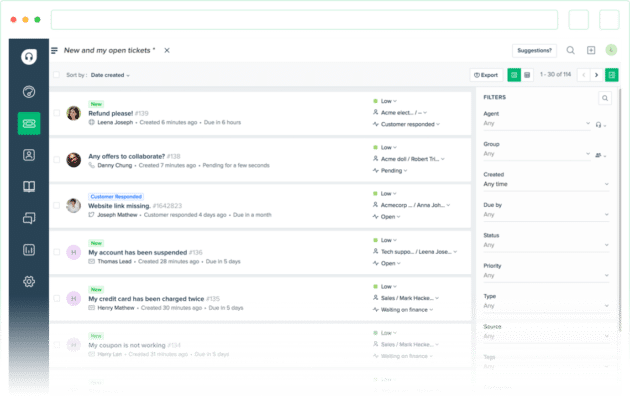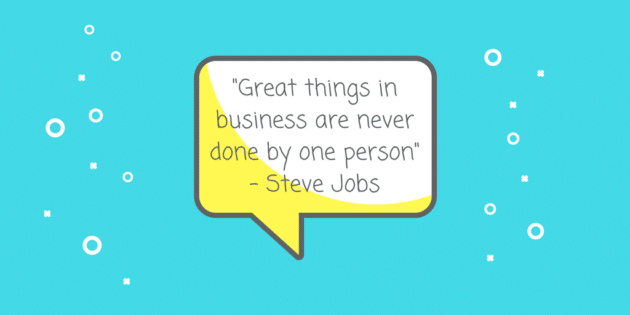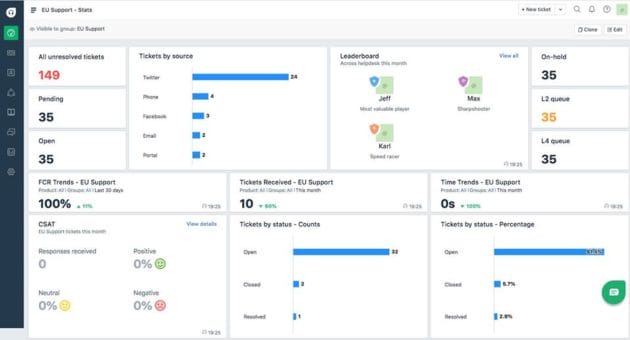Owing to today’s fast-paced lifestyles, consumers don’t have time for gimmicky campaigns. Instead, they take stock of their direct experience with brands, listen to what their family and friends have to say, and go by the customer reviews that crop up online. This highlights the centrality of customer service to the process of showcasing a business in the best possible way.
A customer support team that always offers product knowledge and helps consumers solve product-related issues will gain the customer’s trust and confidence. Thereby, good customer service makes the company position itself easily in the market as a trustworthy ally to the customers without emptying the company’s pockets with high-budget marketing campaigns.
It may come as a surprise to many. But help center software solutions offer a functional and creative solution for not only customer service but also marketing activities. We will explore this more in the next section; before that, let us first understand how support and marketing functions are interrelated in the modern marketplace.
The Traditional Marketing Funnel has Evolved
“Each time you offer a ‘wow’ moment to your customers, you add an emotional element to their experience. And that’s the ultimate aim of marketing – to appeal to the target audience and make them stick with the product!”Forbes
The traditional marketing funnel doesn’t hold in the present-day scenario. Nowadays digital innovations have opened up novel ways of interacting with customers.
Image source: imgur.com.
Moreover, this model places the burden of generating new business purely on sales and marketing teams. It further assumes that the only way to find prospects and get them to know about you is through advertising and marketing campaigns.
But there are people already interested in your business and those who have previously bought your products and services. Progressive companies do not ignore this cohort. Instead, they actively seek out opportunities to build relationships with past customers, promote repeat purchases, and attract new propositions for not just the marketing department but the entire company.
Besides the traditional aspects, ‘retention’ also needs to be emphasized as acquiring new customers each time can prove costly and frustrating. With that perspective, positive customer service becomes the chief component of any client-facing task.
Image source: brightlocal.com.
Industry research also validates these claims. According to PwC, nearly 65% of US consumers attach more value to superior brand experiences than great advertising. At the same time, better interactions with your customers fetch you word-of-mouth popularity. This means more eyeballs on your products and ultimately more sales.
A BrightLocal study in 2020 discovered that more than three-fourths of consumers trust online reviews almost as much as personal recommendations. Further, Bain & Company indicates that a mere 5 percent increase in customer retention can result in a revenue jump of as much as 25 to 95 percent.
How Does Help Center Software Come into the Picture?
With a help center or helpdesk software, you can bring all customer conversations to a single place. You can streamline your communication across channels and track user requests with ease. These functionalities allow your teams to handle support issues better and leave a lasting impact on your target audience.
Suppose you are an e-tailer selling apparel on your website. Your customers may ping you for queries, or have questions regarding sizing, clothing material, shipping costs, delivery dates, etc. After they receive their orders, they may want to return some products and request you to initiate a refund, and so on. They can contact you via phone or email.
But it is quite possible in today’s social media age that they tweet about their issue before they even reach out! If you don’t address their concerns, you run the risk of tarnishing your brand image. After all, increased online visibility can be both a boon and a bane.
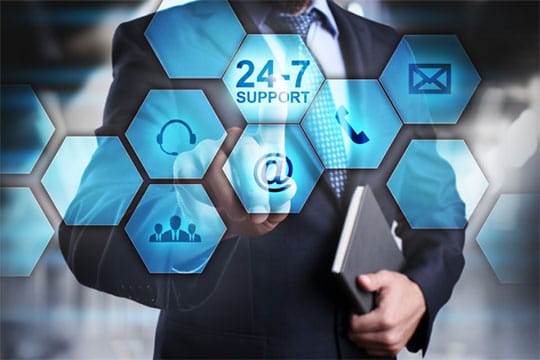
Now, let’s say that your support team had a help desk system that allowed convenient monitoring of issues and requests across multiple channels, including phone, email, website, and social media. It would be way more straightforward for your customer service staff to take up the conversation on priority on a preferred platform. They can either begin a conversation on Twitter itself, switch to email, or even offer a resolution over a phone call.
Good customer service includes a quick response to customer queries and a helpdesk solution helps you achieve it. A helpdesk allows you to monitor an agent’s SLA which can resolve all the queries on time.
Now we have understood how helpdesk software can help enhance customer service and marketing efforts. Let us uncover the nuts and bolts of the technology.
“Think of a help desk speaking every channel’s language; your customer service department can now sort and address complaints better than ever before.”
Guide to Improving Customer Service with a Helpdesk System
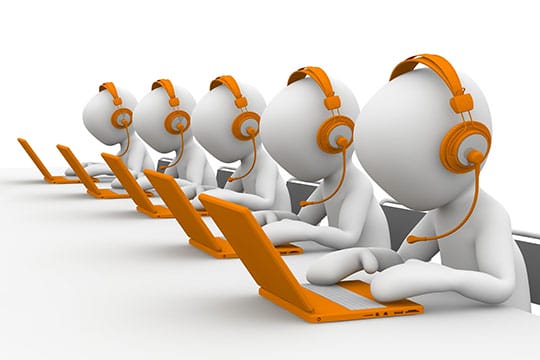
The uses and benefits of helpdesk tools extend from small-sized businesses to large-scale enterprises. Although every solution is different, there are some essential capabilities that you must look for in the help center technology for your business. These features are summarized below.
1. Multichannel
Your help center system should facilitate efficient management of incoming tickets by performing the following tasks:
- Automatic tagging. Adding tags to identify the type of conversations you are having with your customers.
- Automatic categorizing. This will help you categorize your tickets based on their priorities, problem types, and departments.
- Automatic assignment. Allows you to assign tickets to the right team or group to avoid delays.
Image source: freshdesk.com.
With this, customer issues from multiple sources like emails, and social media are organized at a unified location, allowing your agents to respond quickly. They also do not have to juggle different login details and passwords.
2. Automation
You should go for a helpdesk option that reduces the efforts that your agents put in to make the customer happy. In other words, it should be replete with powerful automation features that can take care of manual and repetitive tasks.
Typically, customer support software comes with automation features based on time and event triggers. You can also chart customized workflows to ensure that tickets get routed to the right service representatives, attaining the fastest response and resolution. It provides quick clarifications to the customer thereby improving the agent’s productivity.
3. Collaboration
What sets modern organizations apart from the siloed structures of yesteryears is their orientation towards teamwork. A good help desk software builds on this philosophy to provide collaborative features that increase organization-wide visibility and sharing.
Image source: medium.com.
With a helpdesk, your teams are constantly on top of things. Your agents are proactively informed about incoming tickets, managers know about the agents who are handling them, and the decision-makers have oversight on the responses and priorities to enable continuous improvement.
All in all, the software lets you collaborate better, beyond geographical boundaries, keeping everyone on the same page without much effort, which in turn increases the overall customer-orientedness of the business.
4. Customization
The customer service experience is an extension of your brand in the eyes of the customer. When it comes to enterprise support, it is possible to customize the entire process to suit your needs. For example, you can tailor the after-sales procedures and interactions to be more reflective of your business. Or you can build an innovative customer loyalty program integrated with the support function. So, it makes sense to opt for a tool that gives you the chance to tweak the platform and align it better with your voice and vision.
5. Reporting and Analytics
Finally, no business task is truly beneficial unless it is measured and improved upon. It is, therefore, recommended to choose a technological suite with in-built mechanisms for performance measurement.
Most helpdesk systems have robust analytics and reporting features that track relevant metrics to help you understand what your teams are doing, where they are excelling, and where they are lacking.
Image source: freshdesk.com.
Such capabilities come in handy when generating personalized reports and identifying improvement areas to guide future business performance.
This winds up our guide to adopting a help center software for leveling up customer service and marketing. Let’s recap a few key points discussed above.
Some Final Thoughts

Industry insights point to increasing customer retention by personalizing customer support operations, primarily because acquiring new customers is expensive. Research also suggests that customer-centric company cultures enhance the overall brand image.
In the digital age, customer service is not limited to resolving issues; it is also about delivering superior experiences that make buyers come back to you and become advocates for your products or buy more from you. This enhances your cross-selling and up-selling opportunities.
Furthermore, positive reviews generate more traction and currency for a business than self-promotion.
To make this happen, enterprises can empower their teams with technology that simplifies communication, connecting disjointed support channels, and automating day-to-day activities, all the while retaining the emotional fabric or ‘human factor’ in customer interactions. A helpdesk software brings all this and more to help you realize the advantages of the ‘customer service and marketing’ power duo!
This article is written by Varun Kumar. Varun works in marketing for the Customer Experience persona at Freshworks. When he is not working, he likes to play cricket and watch movies.


